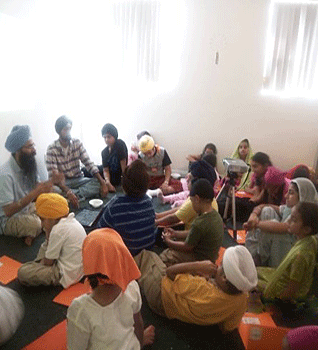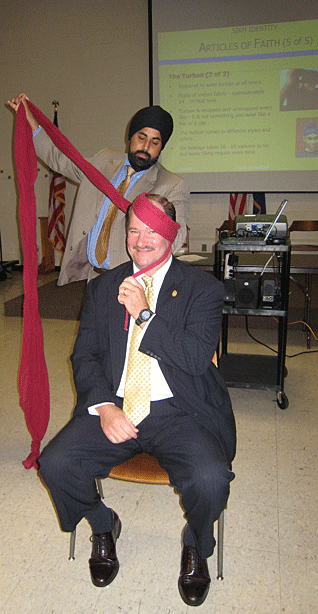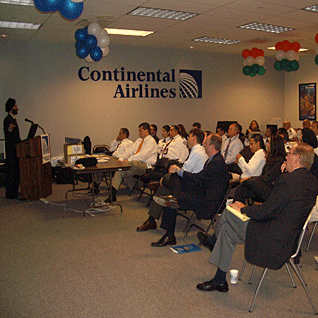Our Heroes
SALDEF
What's in a Name?
by RAJDEEP SINGH JOLLY
SALDEF (The Sikh American Legal Defense and Education Fund) has been named, jointly with The Sikh Coalition and United Sikhs, as The Chic Sikhs of the Year 2008!
The Sikh American Legal Defense and Education Fund (SALDEF) was founded in 1996 as a counterpoint to distortions of the Sikh religion in the mainstream media and has since evolved into a full-fledged civil rights organization.
Its mission is to protect and promote the civil rights and overall condition of Sikh Americans through advocacy and education. The work of SALDEF can be neatly summarized by examining its name:
Sikh American
The story of Sikhs in the United States is filled with irony. The core Sikh beliefs of liberty and universal equality foreshadowed the American Declaration of Independence and United States Constitution by hundreds of years, but yet Sikh Americans are still being forced to choose between religious freedom and a job.
As practitioners of self-reliance and believers in the creed that anything can be accomplished through hard work, Sikhs in the United States are among the most American of Americans, and yet they are often told - directly or indirectly - that wearing a turban is incommensurate with being an American. Sikhs are among the most visible Americans, and yet they are conspicuously absent from the mainstream media and are, in many other respects, invisible.
SALDEF was founded in part to make Sikh Americans more visible.
To its credit, the Sikh-American community amassed wealth and constructed ornate gurdwaras during the last few decades, but we neglected to venture outside of our shells.
Prior to the formation of SALDEF in 1996, most Americans - even at the level of government and media - knew little or nothing of Sikhs. In government and media, we were widely regarded as "extremists" and "militants." In society at large, we were widely regarded as a mysterious community, whose patriarchs bore a resemblance to cartoon genies and the Ayatollah Khomeini. We were widely regarded as followers of a Hindu sect or a Muslim sect - or an exotic Hindu/Muslim sect - and it was never obvious to ordinary Americans whether Sikh children with top-knots were boys or girls.
After September 11, 2001, the Sikh-American community paid a price for its introversion in the form of increased hate crimes and discrimination, and it became clearer to Sikh Americans that they needed to embrace their American identity, avail themselves of the tools of civic engagement, and become more active participants in the public discourse.
SALDEF anticipated this need several years before September 11, 2001 but was forced to accelerate and expand its efforts after that fateful day through legal defense and education.
Legal Defense
"Legal defense" encompasses legal referral, advocacy, and government relations. SALDEF is backed by an extensive network of volunteer attorneys throughout the United States and is in the process of expanding its referral network to cover all 50 states.
The need for legal defense is not theoretical. In June 2008, Mr. Sukhbir Singh Channa - a Sikh musician - filed a class action religious discrimination lawsuit against Walt Disney Entertainment, Inc. According to the lawsuit - filed by the Florida law firm Sarelson & Shafir - Mr. Channa was denied a job by Disney because of his turban and beard and was told that he did not have "the Disney Look."
Long before the lawsuit was filed, a Disney spokesperson gave an interview to a college magazine and stated that, "[t]he Disney look is a fresh, clean and approachable look[.]"
As noted by SALDEF, the implication of this statement is that the Sikh look is unfresh, unclean, and unapproachable - an attitude that unfortunately finds favor among people who don't believe that "it's a small world after all."
The lawsuit generated national and international press coverage, and the litigation process is underway.
In September 2008, SALDEF scored a major legal victory in collaboration with the American Civil Liberties Union (ACLU) of Texas.
Mr. Amardeep Singh - a Sikh American - was expelled from a Dallas County courtroom in 2006 because he wore a turban. After the ACLU filed suit on his behalf, Dallas County settled the dispute and agreed to adopt SALDEF's religious accommodation guidelines, thus giving observant Sikhs - and Muslims and Jews - the right to wear religious head coverings in courtrooms throughout Dallas County.
Throughout 2008, as a proactive measure, SALDEF engaged with the Department of Homeland Security, the Federal Protective Service (which regulates security in federal buildings), and the Transportation Security Administration with a view toward securing clarity about rules affecting the right of Sikh Americans to wear kirpans.
Although several courts throughout the United States have recognized the religious nature of the kirpan and helped to decriminalize the possession of an article of faith, Sikh Americans are forbidden from entering federal buildings while wearing kirpans longer than 2.5 inches and are categorically forbidden from wearing them on airplanes.
These limitations reinforce the widespread notion that the kirpan is fundamentally a weapon and makes it difficult for observant Sikhs to lead their lives with all five articles of faith intact.
As a practical matter, the rule regarding federal buildings ignores the fact that the kirpan is no more capable of being weaponized than a pair of scissors, a letter opener, or any other object that one would expect to find in an office building.
The rule regarding airplanes is plainly difficult to reconcile with regulations that permit air travelers to board airplanes with four-inch scissors, seven-inch screwdrivers, and round-bladed butter knives.
The objective of SALDEF is to promote more sensible guidelines regarding the kirpan and help ease the burden on observant Sikhs.
Toward the end of 2008, and with a view toward the future, SALDEF submitted a memorandum to the Obama/Biden Transition Team and noted that one of the biggest legal challenges facing Sikh-Americans today is their inability to join the U.S. Armed Forces as a matter of military policy.
Apart from being illegal - a demonstrable violation of the Religious Freedom Restoration Act - this policy of preclusion is counterproductive in the context of contemporary geopolitics; SALDEF has argued that the recruitment of Sikh Americans into the U.S. Armed Forces will help mitigate cultural competency deficiencies with respect to areas of the world that are of vital strategic importance to the United States - India, Pakistan, and Afghanistan.
Education
The job of educating others about the Sikh religion is interdisciplinary and is accomplished through a variety of media.
For example, in 2007, SALDEF produced a law enforcement training video for the U.S. Department of Justice entitled On Common Ground.
This short training film has been screened to over 130,000 state and federal law enforcement officials and has been viewed by approximately 43,000 Transportation Security Administration (TSA) screeners throughout the United States in connection with SALDEF's Law Enforcement Partnership Program.
During the summer of 2008, SALDEF communicated with film industry executives at Warner Brothers to express concern about their gratuitous use of the racial slur "towelhead" as the title for a controversial film directed by Alan Ball and based on a novel by author Alicia Erian. Although SALDEF repeatedly cited instances in which the word "towelhead" had been used in the context of hate crimes against Sikh Americans, Warner Brothers refused to change the title.
The culmination of this exchange was the taping of a debate between SALDEF, Ball, and Erian, in which Ball - an Academy Award winner - expressed a desire to integrate Sikh artists into the film industry. The debate is included on the DVD version of the movie.
In September 2008, a school in the Bay Area of California proactively contacted SALDEF to give an anti-bullying presentation to the entire student body in response to reports that Sikh students had been harassed.
The following month, SALDEF worked with officials at another California school to address an incident in which a teacher made rude remarks to a Sikh-American student about his turban.
Part of the job of SALDEF is to educate Sikh Americans about their rights. Since 2002, SALDEF has organized Know Your Rights workshops for Sikh-American communities in California, Florida, Illinois, Indiana, Maryland, New Jersey, Pennsylvania, Virginia, and Texas.
These educational forums not only allow Sikh Americans to learn about their rights and interact with government officials but also enable government agencies to learn about the Sikh religion and ongoing challenges faced by Sikh Americans, including hate crimes, employment discrimination, and school bullying.
Participating agencies have included the U.S. Department of Justice, the Federal Bureau of Investigation, the U.S. Equal Employment Opportunity Commission, and local school boards.
Fund
SALDEF has achieved its ambitious objectives with a modest budget since 1996 and will hopefully continue its work for generations to come with the support of the Sikh-American community.
The Jewish-American community is robustly represented by such eminent organizations as the Anti-Defamation League, and the African-American community is also backed by legions of advocacy groups. Sikh Americans should collectively aspire to amplify their own voices - as other minority communities have - and make the Sikh identity an integral and inseparable part of the American mainstream.
This is the mission of SALDEF, and that is how we make our name.
[For more info, please visit www.saldef.org]
January 1, 2009
Conversation about this article
1: Khushwant Singh (Chandigarh, Punjab), January 01, 2009, 2:10 PM.
Hats off to SALDEF. Probably no one else in the media has dealt as closely with Saldef as I have. Having said that, I can without hesitation claim that I have found this organisation to be of the top calibre. It is professional, non-biased and practical to the core. Cheers to Manjit, Kavneet, Rajbeer and all other members who have made Saldef what it is. Please support this organization as best as you can.
2: Ranbir Kaur (Germany), January 02, 2009, 3:36 AM.
I wish we had some advocacy like this here in Germany. It's impossible for the Sikhs to keep their turbans here while doing some decent job. Only drivers and dishwashers are keeping kesh.






